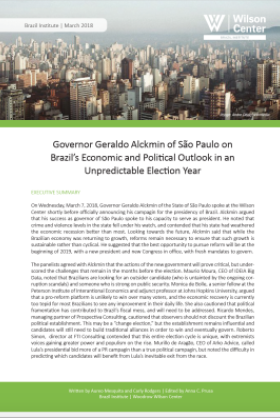Event Summary: Governor Geraldo Alckmin of São Paulo on Brazil’s Economic and Political Outlook in an Unpredictable Election Year



On Wednesday, March 7, 2018, Governor Geraldo Alckmin of the State of São Paulo spoke at the Wilson Center shortly before officially announcing his campagin for the presidency of Brazil. Alckmin argued that his success as governor of São Paulo spoke to his capacity to serve as president. He noted that crime and violence levels in the state fell under his watch, and contended that his state had weathered the economic recession better than most. Looking towards the future, Alckmin said that while the Brazilian economy was returning to growth, reforms remain necessary to ensure that such growth is sustainable rather than cyclical. He suggested that the best opportunity to pursue reform will be at the beginning of 2019, with a new president and new Congress in office, with fresh mandates to govern.
The panelists agreed with Alckmin that the actions of the new government will prove critical, but underscored the challenges that remain in the months before the election. Maurio Moura, CEO of IDEIA Big Data, noted that Brazilians are looking for an outsider candidate (who is untainted by the ongoing corruption scandals) and someone who is strong on public security. Monica de Bolle, a senior fellow at the Peterson Institute of International Economics and adjunct professor at Johns Hopkins University, argued that a pro-reform platform is unlikely to win over many voters, and the economic recovery is currently too tepid for most Brazilians to see any improvement in their daily life. She also cautioned that political fragmentation has contributed to Brazil’s fiscal mess, and will need to be addressed. Ricardo Mendes, managing partner of Prospectiva Consulting, cautioned that observers should not discount the Brazilian political establishment. This may be a “change election,” but the establishment remains influential and candidates will still need to build traditional alliances in order to win and eventually govern. Roberto Simon, director at FTI Consulting contended that this entire election cycle is unique, with extremists voices gaining greater power and populism on the rise. Murillo de Aragão, CEO of Arko Advice, called Lula’s presidential bid more of a PR campaign than a true political campaign, but noted the difficulty in predicting which candidates will benefit from Lula’s inevitable exit from the race.

The Brazil Institute—the only country-specific policy institution focused on Brazil in Washington—aims to deepen understanding of Brazil’s complex landscape and strengthen relations between Brazilian and US institutions across all sectors. Read more


